新沪教版英语初初一下册Unit 8知识讲解
沪教版七下英语Unit 8知识点
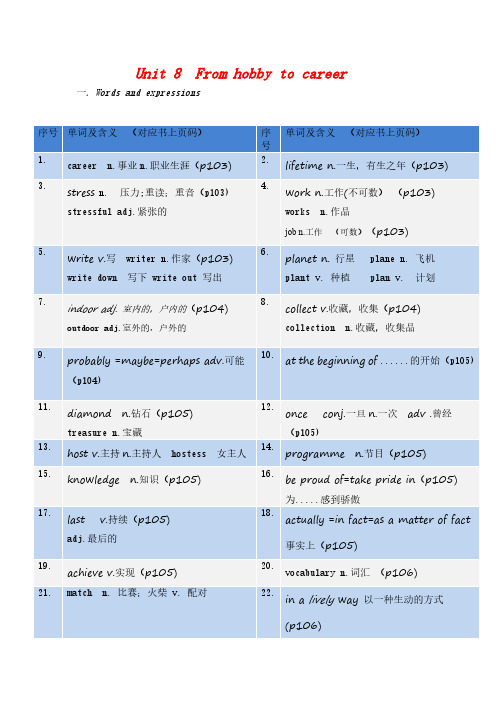
Unit8From hobby to career 一.Words and expressions1.In this unit,you will learn about how some people’s hobbies became their careers.(p103)考点:名词所有格(’s所有格和of所有格)(1).单数名词和不以-s结尾的复数名词的所有格通常在词尾加’s,如minute’s,Women’s Day;以-s结尾的复数名词的所有格在词尾加’,如minutes’。
(2).用and连接两个并列名词,如果表示两者共同拥有,只在最后一个名词后加’s即可,如:Jim’s and Tim’s;如果表示两者各自拥有,则每个名词后都加’s,如Jim and Tim’s。
(3).表示时间、国家等无生命的事物的名词,可在词尾加’s或’来构成所有格(如today’s paper,China’s capital)。
(4).“of+’s所有格”这种形式被称为名词的双重所有格,常用来表示整体中的一部分,如:a friend of my brother’s。
考点:五个变化的辨析grow:用法:grow表示“逐渐变成新的状态”的含义,强调渐变的过程。
也可以指grow 形状变大或变小。
Growing old is so awful.get:用法:get多用于口语,表示一种变化过程,强调的是“渐渐变得”,后常接形容词的比较级形式。
get天变黑、变长或变短。
It is getting dark.天要黑了.become:最普通用词,作为连系动词,指从一个状态向另一个状态的变化,是一个中性词,用于意义好、坏两方面的变化都可以。
多指身份、职位等的变化,它强调变化的过程已经完成。
After giving up smoking,he became fat and irritable.戒烟后,他发福了,而且老爱发火。
turn:侧重指变得与原来截然不同,有时含贬义。
沪教牛津版牛津版七年级下册英语知识点总结Unit8 From hobby to career
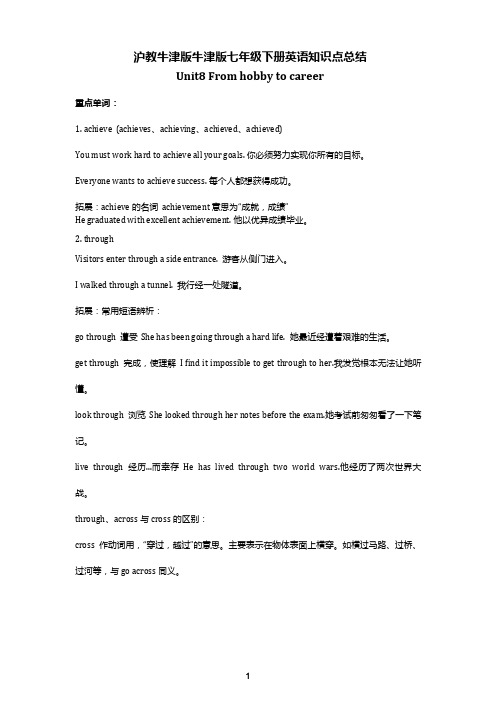
沪教牛津版牛津版七年级下册英语知识点总结Unit8 From hobby to career重点单词:1. achieve (achieves、achieving、achieved、achieved)You must work hard to achieve all your goals. 你必须努力实现你所有的目标。
Everyone wants to achieve success. 每个人都想获得成功。
拓展:achieve的名词achievement 意思为“成就,成绩”He graduated with excellent achievement. 他以优异成绩毕业。
2. throughVisitors enter through a side entrance. 游客从侧门进入。
I walked through a tunnel. 我行经一处隧道。
拓展:常用短语辨析:go through 遭受 She has been going through a hard life. 她最近经遭着艰难的生活。
get through 完成,使理解I find it impossible to get through to her.我发觉根本无法让她听懂。
look through 浏览 She looked through her notes before the exam.她考试前匆匆看了一下笔记。
live through经历...而幸存He has lived through two world wars.他经历了两次世界大战。
through、across与cross的区别:cross 作动词用,“穿过,越过”的意思。
主要表示在物体表面上横穿。
如横过马路、过桥、过河等,与go across同义。
Be careful when you cross the street.过马路时要小心。
across是介词,有“横跨,横穿,穿越”之意。
沪教牛津版初中英语七年级下册Unit 8知识点梳理

沪教牛津版初中英语七年级下册Unit 8知识点梳理Unit8单词career n.事业planet n.行星[ˈplænɪt]satellite n.卫星['sætəlaɪt]velvet n.丝绒,天鹅绒['velvɪt]diamond n.钻石[ˈdaɪəmənd]shoot v.(朝某个方向)射,冲,飞驰[ʃɒt]host v.主持[həʊst]knowledge n.知识[ˈnɒlɪdʒ]lively adj.生动的['laɪvli]last v.持续[lɑːst]actually adv.事实上['æktjʊəli]anybody pron.任何人[ˈenɪˌbɒdi]achieve v.(凭长期努力)达到(某目标、地位、标准)[əˈtʃiːv]sail v.驾驶帆船航行[seɪl]decide v.决定[dɪ'saɪd]train v.训练,接受训练[treɪn]alone adv.独自[ə'ləʊn]in the future 将来used to 曾经go outside 外出look like 看起来像...more and more 越来越多grow up 长大['grəʊʌp]go sailing 去进行帆船运动Unit8课文My lifetime hobby-studying stars我一生的兴趣爱好—研究星星by Patrick Moore帕特里克·摩尔When I was eight, I got a book about stars.我八岁的时候,得到了一本关于星星的书。
That was the beginning of my lifetime hobby.那就是我一生中兴趣爱好的开始。
I used to go outside with my mum on clear nights and look at the sky. 我过去常常在明媚的夜晚和我的妈妈出去看星空。
沪教版七 下Unit_8_讲义加练习
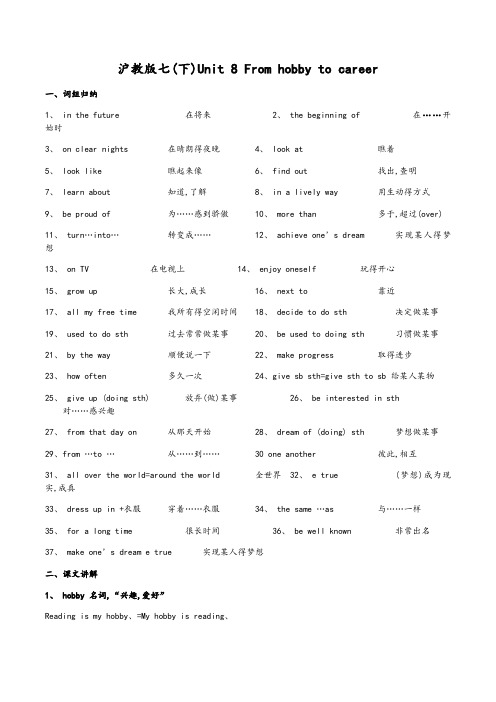
沪教版七(下)Unit 8 From hobby to career一、词组归纳1、 in the future 在将来2、 the beginning of 在……开始时3、 on clear nights 在晴朗得夜晚4、 look at 瞧着5、 look like 瞧起来像6、 find out 找出,查明7、 learn about 知道,了解8、 in a lively way 用生动得方式9、 be proud of 为……感到骄傲10、 more than 多于,超过(over)11、 turn…into…转变成……12、 achieve one’s dream 实现某人得梦想13、 on TV 在电视上14、 enjoy oneself 玩得开心15、 grow up 长大,成长16、 next to 靠近17、 all my free time 我所有得空闲时间18、 decide to do sth 决定做某事19、 used to do sth 过去常常做某事20、 be used to doing sth 习惯做某事21、 by the way 顺便说一下22、 make progress 取得进步23、 how often 多久一次24、give sb sth=give sth to sb 给某人某物25、 give up (doing sth) 放弃(做)某事26、 be interested in sth对……感兴趣27、 from that day on 从那天开始28、 dream of (doing) sth 梦想做某事29、from …to …从……到……30 one another 彼此,相互31、 all over the world=around the world 全世界32、 e true (梦想)成为现实,成真33、 dress up in +衣服穿着……衣服34、 the same …as 与……一样35、 for a long time 很长时间36、 be well known 非常出名37、 make one’s dream e true 实现某人得梦想二、课文讲解1、 hobby 名词,“兴趣,爱好”Reading is my hobby、=My hobby is reading、2、 Learn to stress some two-syllable words used as both nouns and verbs、学会对既可用作名词又可用作动词得双音节词得重读、both … and…既……又……,……与……两者都……。
七年级下unit8知识点
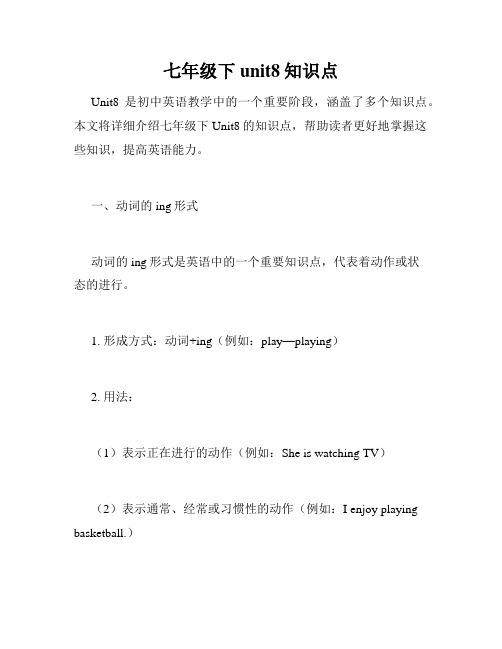
七年级下unit8知识点Unit8是初中英语教学中的一个重要阶段,涵盖了多个知识点。
本文将详细介绍七年级下Unit8的知识点,帮助读者更好地掌握这些知识,提高英语能力。
一、动词的ing形式动词的ing形式是英语中的一个重要知识点,代表着动作或状态的进行。
1. 形成方式:动词+ing(例如:play—playing)2. 用法:(1)表示正在进行的动作(例如:She is watching TV)(2)表示通常、经常或习惯性的动作(例如:I enjoy playing basketball.)(3)作定语或表语(例如:The dancing girl is very beautiful.)二、一般现在时态一般现在时态是英语中最基础的时态,具有多种用法。
1. 形式:主语+动词原形(第三人称单数需加s)2. 用法:(1)表示现在正在进行的动作(例如:I am listening to music.)(2)表示经常性的、习惯性的或普遍性的事情(例如:She often watches TV.)(3)表示判断、命令或表示常态(例如:The sun rises in the east.)三、时间状语时间状语在英语中也是重要的语法 unit,用来表达动作、事情发生的时间或持续的时间等。
1. 常见时间状语(时间点):(1)now 现在(2)today 今天(3)tonight 今晚(4)tomorrow 明天(5)yesterday 昨天(6) last week/month/year 上周/上月/去年2. 常见时间状语(时间段):(1)all day 整天(2)every day 每天(3)once a week/month/year 每周/月/年一次(4)in the morning/afternoon/evening 在早上/下午/晚上四、形容词的比较级和最高级形容词的比较级和最高级涉及到了英语中的等级语法,以便用来描述某两个或多个人或事物之间的差异。
初中英语沪教版七年级下册Unit8《Reading My lifetime hobby ----- studying stars》优质课公开课教案
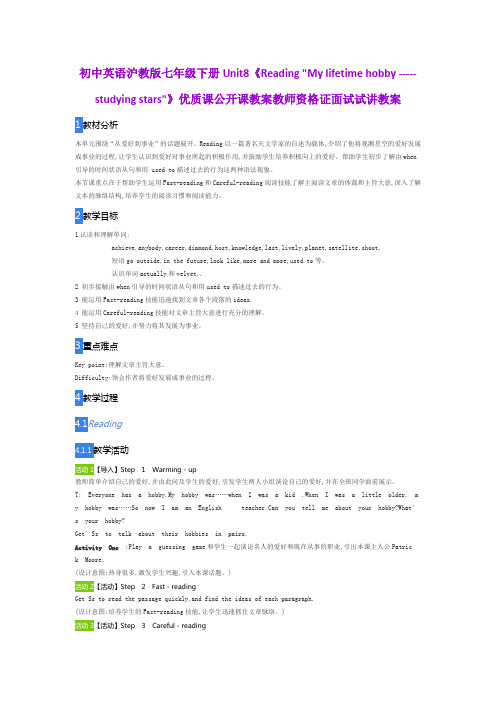
初中英语沪教版七年级下册Unit8《Reading "My lifetime hobby ----- studying stars"》优质课公开课教案教师资格证面试试讲教案1教材分析本单元围绕“从爱好到事业”的话题展开。
Reading以一篇著名天文学家的自述为载体,介绍了他将观测星空的爱好发展成事业的过程,让学生认识到爱好对事业所起的积极作用,并鼓励学生培养积极向上的爱好。
帮助学生初步了解由when 引导的时间状语从句和用 used to描述过去的行为这两种语法现象。
本节课重点在于帮助学生运用Fast-reading和Careful-reading阅读技能了解主阅读文章的体裁和主旨大意,深入了解文本的脉络结构,培养学生的阅读习惯和阅读能力。
2教学目标1认读和理解单词:achieve,anybody,career,diamond,host,knowledge,last,lively,planet,satellite,shoot,短语go outside,in the future,look like,more and more,used to等。
认识单词actually和velvet..2 初步接触由when引导的时间状语从句和用used to描述过去的行为。
3 能运用Fast-reading技能迅速找到文章各个段落的ideas.4 能运用Careful-reading技能对文章主旨大意进行充分的理解。
5 坚持自己的爱好,并努力将其发展为事业。
3重点难点Key point:理解文章主旨大意。
Difficulty:领会作者将爱好发展成事业的过程。
4教学过程4.1Reading教学活动1【导入】Step 1 Warming-up教师简单介绍自己的爱好,并由此问及学生的爱好,引发学生两人小组谈论自己的爱好,并在全班同学面前展示。
T: Everyone has a hobby.My hobby was……when I was a kid .When I was a little older, m y hobby was……So now I am an English teacher.Can you tell me about your hobby?What’s your hobby?Get Ss to talk about their hobbies in pairs.Activity One:Play a guessing game和学生一起谈论名人的爱好和现在从事的职业,引出本课主人公Patrick Moore.(设计意图:热身很多,激发学生兴趣,引入本课话题。
2015-2016学年牛津沪教版初中英语七年级下册Unit1-Unit8单元词汇重点知识点【精品推荐】

七年级下Unit1-Unit8单元词汇重点知识点Unit1-Unit8单元词汇(Words 183)Unit 1 People Around UsUnit 2 Travelling Around The WorldUnit 3 Our animal friendsUnit 4 Save The TreesUnit5 WaterUnit 6 ElectricityUnit 7 PoemsUnit8 From hobby to careerUnit 1 (Words 27)person n. 人cheerful adj. 快乐的;高兴地hard-working adj. 工作努力的;勤勉的patient adj. 耐心的smart adj. 聪明的;机敏的probably adv. 很可能forget v. (过去式forgot)忘记smell n. 气味care n. 照顾;照料miss v. 想念;怀念joke n. 玩笑laugh v. 笑remain v. 仍然是;保持不变strict adj. 严格的;严厉的encourage v. 鼓励support n. 支持successful adj. 获得成功的member n. 成员paragraph n. 段落as well 除……之外;也take care of 照顾;照料tell jokes 讲笑话make fun of 嘲弄;取笑(be) strict about 对……要求严格give up 放弃go to work 上班all day and all night 夜以继日Unit 2 (Words 30)France n. 法国French adj. 法国的flag n. 旗帜wine n. 葡萄酒tick v. 标记号;打上钩possible adj. 可能的Europe n. 欧洲store n. (大型)百货商店*vineyard n. 葡萄园excellent adj. 优秀的south n. 南部;南方lie v. (过去式lay)位于;坐落在coast n. 海岸;海滨perfect adj. 完美的prefer adj. 更喜欢ski v. 化学tower n. 塔finish v. 完成lift n. 电梯;升降机step n. 台阶stairs n.[pl.] 楼梯receiver n. 接受者date n. 日期greeting n. 问候address n. 地址(be) famous for 以……而闻名department store 百货商店prefer to 更喜欢go on holiday 去度假go sightseeing 去观光Unit 3 (Words 30)blind adj. 瞎的;失明的radio n. 无线电广播programme n. 节目helpful adj. 有用的;有帮助的*rescue n. 营救mean v. (过去式meant)表示……的意思*receptionist n. 接待员allow v. 允许进入(豁出去、通过)pet n. 宠物anywhere adv. 任何地方apologize v. 道歉lead v. (过去式led)带领bark v. (狗)吠叫wake v. (过去式woke)醒来towel n. 毛巾bottom n. 底部finally adv. 终于;最后airport n. 机场appear v. 出现act v. 扮演(喜剧、电影中的角色)climb v. 攀登;攀爬dark adj. 黑暗的nothing pron. 没有什么;没有一件东西arrive at 到大by oneself 独自lead (sb.) to 带着(某人)到……fall asleep 入睡wake up 醒来get down 蹲下;趴下fire engine 消防车Unit 4 (Words 29)save v. 征求pine n. 松树discuss n. 讨论branch n. 树枝*root n. 根fight v. (过去式fought)与……作斗争against prep. 反对example n. 例子harmful adj. 有害的gas n. 气体produce v. 产生;生产oxygen n. 氧气major adj. 主要的convenient adj. 方便的furniture n. 家具imagine v. 想象;设想disease n. 疾病dig v. (过去式dug)挖hole n. 洞carry n. 搬;扛;背*container n. 容器take in 吸收come from 来自for example 例如in fact (补充细节)确切地说look around 环顾四周(be) made of 由……职称millions of 大量的;数以百万计的(be) good for 对……有用;有好处Unit 5 (Words 30)drop n. 滴v. 掉下;落下journey n. 旅行;旅程quantity n. 数量experiment n. 实验;试验fresh adj. 淡的;无盐的salt n. 盐on adv. (表示已连接、处于工作状态或使用中)voice n. 嗓音、说话声reservoir n. 水库add n. 增加;添加chemical n. 化学品through prep. 通过;穿过pipe n. 管道valuable adj. 宝贵的;很有用的bit n. 有点;一点bank n. 银行change n. 找给的零钱;找头return v. 归还*vapour n. 蒸汽;雾气form v. 形成;构成*stir v. 搅拌continue v. 继续*crystal n. 结晶(体)turn off 关掉add ... to ... 把……加入……a bit 一点part of ……的一部分pocket money (父母给孩子的)零花钱(be) made up of 由……组成dry up 干涸Unit 6 (Words 27)electricity n. 电conversation n. 谈话*identity v. 确认;认出rule n. 规则anyone pron. 任何人reply v. 回答foolish adj. 愚蠢的wire n. 电线connect v. (使)连接*cable n. 电缆moment n. 瞬间;片刻battery n. 电池cooker n. 厨灶;炉具fridge n. 冰箱*bulb n. 电灯泡lock v. (用锁)锁上test v. 测试tidy v. 使整洁;使整齐touch v. 触摸;碰a packet of 一袋in a way 在某种程度上(be) connected to 连接到power station 发电站washing machine 洗衣机switch off 关(电灯、机器等)tidy up 收拾妥;整理好air conditioner 空调Unit 7(Words 26)poem n. 诗歌ordinary adj. 普通的;平凡的feeling n. 感觉;情感order n. 命令advice n. 建议aloud adv. 大声地;高声地group n. 组;群agree v. 同意disagree v. 不同意*rhyme n. 押韵词complete adj. 完整的;整个的well n. 井;水井shower n. 淋浴*site n. 建筑工地narrow adj. 狭窄的height n. 高度superman n. 超人seller n. 卖者;卖方smile v.&n. 微笑rush v. 迅速移动crowd n. 人群(not) at all 一点也(不);完全(不)(be) worried about 为……担忧newspaper stand 报摊rush out 冲出去a crowd of 一群Unit 8 (Words24)career n. 视野planet n. 行星satellite n. 卫星*velvet n. 天鹅绒diamond n. 钻石shoot v. (过去式shot)(朝某个方向)射,冲,飞驰host v. 主持knowledge n. 知识lively adj. 生动的last v. 持续*actually adv. 事实上anybody pron. 任何人achieve v. (凭长期努力)达到(某目标、地位、标准)sail v. 驾驶帆船航行decide v. 决定train v. 训练;接受训练alone adv. 独自in the future 将来used to 曾经go outside 外出look like 看起来像……more and more 越来越多grow up 长大go sailing 去进行帆船运动Unit 1 People Around Us1. CheerfulCheerful adj. 快乐的,高兴的Why is he so cheerful?Cheerful是由名词cheer+ful构成。
沪教版牛津英语【初一下册】Unit 8 From hobby to career知识讲解

Unit 8 From hobby to career词句精讲精练撰稿人:王晓丽审稿人: 郭素清词汇精讲1. both…andboth…and…意为“……和……两者都”,连接两个并列成分,可作主语或宾语,作主语时,谓语动词用复数形式。
例如:Both he and I are students. 我和他都是学生。
She can speak both English and French. 她会说英语和法语。
2. job / workwork和job是同义词,都有“工作、职业”的意思。
不过,它们之间还是有些区别的。
(1)job是可数名词,指特定工作。
work是不可数名词,泛指工作。
我们可以说a job,不能说a work。
例如:Peter has a good job in a bank. 彼得在一家银行有份很好的工作。
Tom changed jobs many times. 汤姆换了很多工作。
Looking after three cats is not easy work. 照顾三只猫咪可不是件容易事。
(2)“上班”用英文讲是go to work,这是一个固定搭配,我们不能说go to a job。
例如:My father goes to work at 8 am. 我爸爸八点上班。
(3)job只能用作名词,work还可以用作动词,不仅有“上班、工作”的意思,还可以作“努力”或“从事”来讲。
例如:Both my parents work. 我父母都工作。
If you work hard, you will speak English well. 只要你努力,你的英语就会讲得很好3. livelylively作形容词,“充满活力的,活泼的,有生气的”,常用作定语或表语。
例如:She was a lively young woman with patience and imagination.她是个充满活力的年轻女性,富有忍耐力和想象力。
- 1、下载文档前请自行甄别文档内容的完整性,平台不提供额外的编辑、内容补充、找答案等附加服务。
- 2、"仅部分预览"的文档,不可在线预览部分如存在完整性等问题,可反馈申请退款(可完整预览的文档不适用该条件!)。
- 3、如文档侵犯您的权益,请联系客服反馈,我们会尽快为您处理(人工客服工作时间:9:00-18:30)。
沪教版初中英语一年级下册精编试题及知识点汇总学生姓名:班级:学号:Unit 8 From hobby to career词句精讲精练词汇精讲1. both…andboth…and…意为“……和……两者都”,连接两个并列成分,可作主语或宾语,作主语时,谓语动词用复数形式。
例如:Both he and I are students. 我和他都是学生。
She can speak both English and French. 她会说英语和法语。
2. job / workwork和job是同义词,都有“工作、职业”的意思。
不过,它们之间还是有些区别的。
(1)job是可数名词,指特定工作。
work是不可数名词,泛指工作。
我们可以说a job,不能说a work。
例如:Peter has a good job in a bank. 彼得在一家银行有份很好的工作。
Tom changed jobs many times. 汤姆换了很多工作。
Looking after three cats is not easy work. 照顾三只猫咪可不是件容易事。
(2)“上班”用英文讲是go to work,这是一个固定搭配,我们不能说go to a job。
例如:My father goes to work at 8 am. 我爸爸八点上班。
(3)job只能用作名词,work还可以用作动词,不仅有“上班、工作”的意思,还可以作“努力”或“从事”来讲。
例如:Both my parents work. 我父母都工作。
If you work hard, you will speak English well. 只要你努力,你的英语就会讲得很好3. livelylively作形容词,“充满活力的,活泼的,有生气的”,常用作定语或表语。
例如:She was a lively young woman with patience and imagination.她是个充满活力的年轻女性,富有忍耐力和想象力。
【拓展】辨析:lively, alive, live与living这四个词都可用作形容词,异同点如下:(1) lively常用作定语或表语,意为“充满活力的,活泼的,有生气的”;alive常作表语或后置定语,“有生命的,活的”。
例如:He was alive when they took him to the hospital.人们把他送到医院时他还活着。
He had a strange way of making his classes lively and interesting.他有一种奇妙的方法,使他的课堂生动有趣。
(2) live作定语,“活的,有生命的(主要用来指鸟或其他动物);现场的,直播的”。
例如:Look! These is a live fish in the pool.看!池子里有一条活鱼。
We watched a live television show. 我们观看了一场电视现场直播的表演。
(3) living意为“活的,健在的”。
例如:His grandpa is still living at the age of 96. 他爷爷96岁了,仍然健在。
4. be proud ofproud 是形容词,常用结构:be proud of sth. 意为“以……而骄傲”。
例如:I am very proud of being a Chinese. 作为一名中国人我很自豪be proud to do sth 意为“为做某事而骄傲”。
We are proud to be a league member. 我们为成为团员而骄傲。
【拓展】pride是名词,意为“骄傲,自豪”。
常用的结构:take pride in sth. 意为“为某事骄傲”。
例如:They take great pride in her daughter who is now a famous scientist.他们为成为科学家的女儿而感到自豪。
He is the pride of our city. 他是我们城市的骄傲。
5. decidedecide是动词,意为“决定,选定”。
名词为decision。
(1) decide on…意为“由……决定;决定于……”。
后面接名词、代词或动名词作宾语。
例如:I decided on going to Beijing at last. 最后我决定去北京了。
My mother decided on the red dress. 我妈妈决定买下那件红色的裙子。
(2) decide sth. 例如:I can’t decide anything at the moment. 现在我不能做出任何决定。
(3) decide to do sth. 例如:We decide to go to Paris next month. 我们决定下个月去巴黎。
6. at the end ofat the end of意为“在……末端,在……尽头”,可以表示时间,也可以表示地点。
例如:at the end of January在1月底(表示时间)at the end of the street在街道末端(表示地点)【拓展】(1) by the end of意为“到……末为止”,其后只能接时间,可用于将来时或过去完成时。
例如:We’re going to finish it by the end of this week. 到本周末,我们将完成这项工作。
(2) in the end意为“最后,终于”,相当于at last,finally,其后不能接of短语。
例如:Our team beat theirs in the end.最后,我们队战胜了他们队。
7. maybemaybe作副词,意为“也许;大概”。
例如:Maybe he is a teacher. 也许他是个老师。
【拓展】辨析:maybe与may be(1)maybe是副词,主要用于非正式场合,口语中常用。
意为“也许,大概”。
它通常放在句子的开头,在句子中作状语。
例如:Maybe they won’t come here tonight. 他们大概今晚不会来这儿。
Maybe she is happy. 也许她是幸福的。
(2)may be是“情态动词may+动词原形be”构成的,在句中做谓语,意为“可能是、大概是”。
例如:She may be at home. 她可能在家。
(也可以说:Maybe she is at home.)You may be right. 你可能是对的。
(也可以说:Maybe you are right.)8. alone(1) alone作副词,意为“单独地,孤独地”,相当于by oneself。
例如:It was too heavy for me to carry the bag alone. 我独自背这个袋子,真是太重了。
(2) alone作形容词,意为“单独的,独自的”,只能作表语,不能作定语。
例如:He was alone in the house. 他一个人在屋子里。
【辨析】alone和lonelyalone既可作形容词,也可作副词,表示“单独一人,无人相伴”,陈述客观事实。
lonely只能作形容词,表示“孤独的,寂寞的”,带有强烈的感情色彩;此外,还可表示“荒凉的,偏僻的”,常作定语。
例如:Though the old man is alone, he doesn’t feel lonely.虽然那位老人是一个人,但他并不感到寂寞。
My grandfather used to live in a lonely village.我爷爷过去住在一个偏僻的小村庄里。
词汇精练I. 英汉互译。
1. 将来______________________2. go outside______________________3. 曾经,过去常常______________________4. 看起来像______________________5. more and more ______________________6. 为……感到自豪______________________7. grow up ______________________8. 去进行帆船运动______________________9. make progress ______________________ 10. 实现______________________II. 根据首字母提示完成下列单词。
1. A plane is s_________________ across the sky.2. The twinkling stars at night look like millions of d_________________ in the dark sky.3. Eddie has a wide k_________________ of the world history.4. Our English teacher always makes her class very l_________________.5. Although the film only l_________________ for about 80 minutes, I nearly fell asleep in the middle.6. I think being a teacher will be my lifelong c_________________.7. I don’t know much about Alice. A_________________, I talked with her only once.8. Everyone must work hard to a_________________ success.9. A_________________ can be successful if he or she works hard.10. Mr. Wang will h_________________ the teachers’ New Year’s party this year.III. 用方框中词组的正确形式完成下列句子。
2. Would you like to be a doctor _________________?3. If you freeze water, you _________________ it _________________ ice.4. Alice finally _________________ of being a writer.5. If you want to _________________ the history of our country, I suggest you go to the Palace Museum.6. Don’t you think that Tom quite _________________ his uncle?7. The peacock(孔雀) is very _________________ her features, so she shows them off every day.8. We arrived late at the cinema, so we missed _________________ the film.9. I _________________ drink a lot of soft drinks but now I seldom drink them.10. I think you should _________________ to take in some fresh air.IV.听力链接。
